present perfect tense
现在完成时(The present perfect tense)的用法小结

现在完成时(The present perfect tense)的用法小结一、构成:助动词have / has+p.p(动词的过去分词)二、用法:现在完成时既涉及过去,又联系现在。
用法一:表示过去发生或已经完成的某一动作对现在造成的影响或结果。
常与just(刚刚),already(已经),never(从来没有),ever(曾经),before(以前),yet(仍然),once(一次),twice(两次),many times(很多次),how many times(多少次),so far(迄今为止),during the past(last)three years(最近三年来)等连用。
※副词的位置:①just常用于肯定句中,放在have / has后,He has just come .②never表示否定, 放在have / has后, He has never visited the Great Wall.③ever用于疑问句中,句型为: Have / Has+主语+ever+过去分词?“…曾经……过吗?”用于询问某人过去的经历。
Have you ever been to the farm?④before用于句末,The woman has never heard of that before.⑤yet 用于句末或not 之后.Has the train arrived yet? No, not yet.⑥already用于肯定句, have / has 之后或句末.We have already finished it.⑦so far用于句首或句末. So far, we have visited the moon.用法二:表示过去已经开始,一直延续到现在的动作或状态。
时间状语有:①for+表示一段时间的词语I have taught English for 19 years。
②since+表示过去时间点的词语He has been at this school since 1986.③since+表示过去的时间状语从句I have lived here since I was born.④since+一段时间+ago. I have known him since 20 years ago.三、现在完成时态中可以和表示一段时间状语(for,since,how long, all one’s life)连用的动词必须是表示延续的情况或动作的动词,即延续性动词。
现在完成时态(Present Perfect Tense)
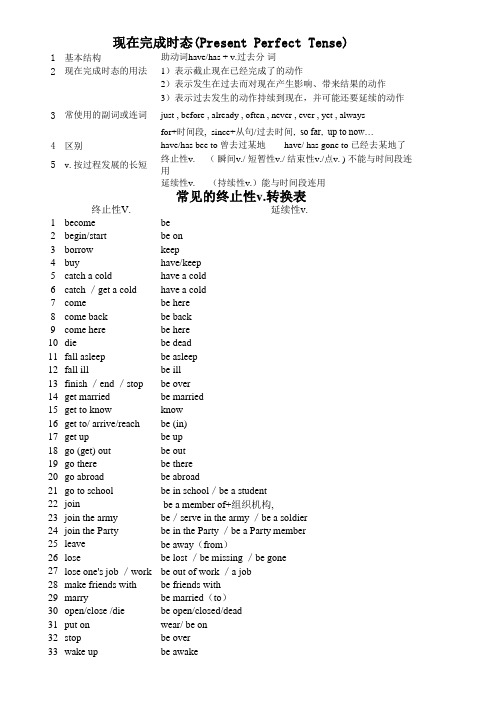
1基本结构助动词have/has + v.过去分 词2现在完成时态的用法1)表示截止现在已经完成了的动作2)表示发生在过去而对现在产生影响、带来结果的动作3)表示过去发生的动作持续到现在,并可能还要延续的动作3常使用的副词或连词just , before , already , often , never , ever , yet , always for+时间段, since+从句/过去时间, so far, up to now…4区别have/has bee to 曾去过某地 have/ has gone to 已经去某地了5v.按过程发展的长短终止性v. ---( 瞬间v./ 短暂性v./ 结束性v./点v. ) 不能与时间段连用延续性v. --- (持续性v.)能与时间段连用终止性V.延续性v.1becomebe 2begin/startbe on 3borrowkeep 4buyhave/keep 5catch a coldhave a cold 6catch /get a coldhave a cold 7comebe here 8come backbe back 9come herebe here 10diebe dead 11fall asleepbe asleep 12fall illbe ill 13finish /end /stopbe over 14get marriedbe married 15get to knowknow 16get to/ arrive/reachbe (in)17get upbe up 18go (get) outbe out 19go therebe there 20go abroadbe abroad 21go to schoolbe in school /be a student 22joinbe a member of+组织机构,23join the armybe /serve in the army /be a soldier 24join the Partybe in the Party /be a Party member 25leavebe away (from )26losebe lost /be missing /be gone 27lose one's job /workbe out of work /a job 28make friends withbe friends with 29marrybe married (to )30open/close /diebe open/closed/dead 31put onwear/ be on 32stopbe over 33wake up be awake现在完成时态(Present Perfect Tense)常见的终止性v.转换表时间段连用。
英语现在完成时语法讲解

英语现在完成时语法讲解英语现在完成时(Present Perfect Tense)是用来表达过去发生的动作或状态与现在的关系的一种时态。
它由“have/has + 过去分词”构成。
现在完成时常用于以下几种情况:1. 表示过去发生的动作对现在造成的影响或结果。
例如:I have lost my key.(我把钥匙弄丢了。
)这里的“have lost”表示过去发生的动作,但是现在没有钥匙导致现在的结果是找不到钥匙。
2. 表示过去发生的动作在现在仍然持续或重复。
例如:He has lived in London for five years.(他在伦敦住了五年了。
)这里的“has lived”表示过去开始的动作,但是他至今仍然住在伦敦。
3. 表示过去发生的动作在现在刚刚完成。
例如:She has just finished her homework.(她刚刚完成了她的作业。
)这里的“has just finished”表示刚刚完成的动作。
4. 表示过去发生的动作在现在的时间段内发生多次。
例如:I have visited Paris many times.(我去过巴黎很多次。
)这里的“have visited”表示过去的多次动作在现在的时间段内持续进行。
需要注意的是,现在完成时与具体的过去时间点无关,而与现在的状态或结果相关。
此外,现在完成时也可以与一些时间状语连用,如just(刚刚)、already(已经)、yet(还)等,以更准确地表示动作发生的时间。
下面是一些现在完成时的例句:- I have finished my work.(我完成了我的工作。
)- Have you ever been to China?(你去过中国吗?)- She has already eaten dinner.(她已经吃过晚饭了。
)- We haven"t seen each other for a long time.(我们很久没有见面了。
现在完成时PresentPerfectTense

现在完成时是表达过去发生的动作对现在造成的影响或结果的一种时态。它 由“助动词have/has + 过去分词”构成。现在完成时的构成Fra bibliotek肯定句
主语 + have/has + 过去分词
否定句
主语 + have/has + not + 过去 分词
疑问句
一般过去时
• 强调过去的动作或事件发生在过去的某个具 体时间。
• 关注的是过程。
现在完成时的时间状语
已经
already
曾经
once
刚刚
just
近来
recently
现在完成时的常见误用
1 与一般过去时混淆
错误使用现在完成时表达在过去某一特定时间发生的动作。
2 与过去完成时混淆
错误使用现在完成时表达先于过去某一动作发生的动作。
Have/Has + 主语 + 过去分词?
现在完成时的用法
1 过去经验的影响
用于表达过去的经验对现在的影响或结果。
2 动作刚刚结束
用于表示刚刚发生或刚刚结束的动作。
3 未来可能发生的动作
用于表示过去某一时间以来一直延续到现在,并可能继续发生的动作。
现在完成时和一般过去时的区别
现在完成时
• 强调过去的经验对现在的影响。 • 关注的是结果。
3 过度使用现在完成时
在不必要的情况下过度使用现在完成时,造成重复。
现在完成时的例句和练习
例句
我已经学习英语三年了。
例句
他们刚刚从巴黎回来。
例句
我吃过很多种不同的蛋糕。
练习
你看过这本书吗?
英语完成时态的标志词

英语完成时态的标志词完成时态(Present Perfect Tense)是英语语法中的一个时态,用于描述已完成的动作或情况,通常与现在有关。
下面是一些常用的完成时态标志词:1. just - 刚刚例如:I have just finished my homework.(我刚刚完成了作业。
)2. already - 已经例如:He has already eaten breakfast.(他已经吃过早餐了。
)3. yet - 尚未例如:She hasn't finished her project yet.(她还没有完成她的项目。
)4. ever - 曾经例如:Have you ever been to China?(你曾经去过中国吗)5. never - 从未例如:I have never been to Europe before.(我以前从未去过欧洲。
)6. for - 自从例如:I have been studying English for 2 years.(我已经学英语学了2年了。
)7. since - 自从例如:He hasn't seen his family since last Christmas.(他自从去年圣诞节后就没见过家人了。
)8. recently - 最近例如:She has recently started a new job.(她最近开始了一份新工作。
)9. already - 已经例如:They have already booked their flight tickets.(他们已经订好了机票。
)10. yet - 还没有例如:We haven't received the parcel yet.(我们还没有收到包裹。
)以上是完成时态常用的标志词,它们能够帮助我们在使用完成时态时更加准确和自然。
现在完成时
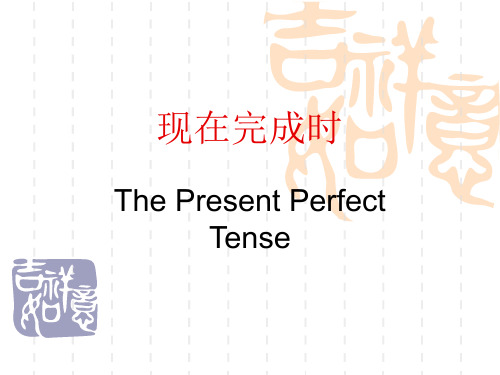
5. just在现在完成时中的用法 用于句中, 表示“刚刚” Eg. I’ve just had breakfast. What have they just done?
现在完成时
The Present Perfect Tense
定义
现在完成时(Present perfect tense)过去 发生并且已经完成的动作对现在造成影响 或后果,过去某一时间开始并一直持续到 现在并且有可能还会持续的动作或状态。
基本结构
肯定句:主语+have/has+过去分词+其他
4. never在现在完成时中的用法
否定句: 句中 “从来没有 ” Eg. I’ve never been to Beijing.
注: 带ever的肯定句变否定句时, 要将 ever变成never; 带ever的一般疑问句作 否定回答时可用“No, never.”
Eg. He has ever made dumplings.
否定句:主语+have/has+not+过去分词+其 他 Have/Has+主语+过去分词+ 一般疑问句: 其他 特殊疑问词+一般疑问句 特殊疑问句: (have/has+主语+过去 分词+其他)
She has learnt English for 3 years 否定句: She hasn't leant English for 3 years. 一般疑问句: Has she leant English for 3 years?
英语知识点:现在完成时(Present Perfect Tense)

英语知识点:现在完成时(Present Perfect Tense)
3. 主谓一致 主语为第三人称单数时,助动词用has;其他情况用have。 六、练习题 1) 填空: a) She __________ (finish) her work already. b) They __________ (not see) this movie yet. c) __________ you ever __________ (be) to New York? d) He __________ just __________ (leave).
英语知识点:现在完成时(PreБайду номын сангаасent Perfect Tense)
3. 表示经历或经验 - 用于描述某人曾经有过的经历或经验。 - 例句:She has traveled to many countries.(她去过很多国家。) 4. 表示刚刚完成的动作 - 通常与just连用,表示刚刚发生或完成的动作。 - 例句:He has just finished his dinner.(他刚吃完晚饭。)
英语知识点:现在完成时(Present Perfect Tense)
五、注意事项 1. 区别一般过去时 一般过去时强调动作发生在具体的过去时间,而现在完成时强调对现在的影响或从过去持 续到现在。 示例: I went to the store yesterday.(一般过去时) vs.I have gone to the store.(现在完 成时) 2. 不可与具体的过去时间状语连用 如yesterday, last week等不能与现在完成时连用,但可以与不具体的时间状语连用,如 ever, never, before等。
英语知识点:现在完成时(Present Perfect Tense)
present perfect tense

Definition
现在完成时表示动作发生在过去, 对现在产生一定影响、造成一定结 果。*可以从以下三个方面来理解。
Present perfect tense:
Definition生或已完成的某个动作对现在产生的影 响或结果,强调的是这个影响或结果,常同already, just, yet等状语连用 She has lost her bike. 她把自行车丢了。(影响 是她现在没有自行车骑了) She has had a good education. 她受到过良好 的教育。(影响是她文化水平高,有修养)
Exercises:
【例3】I ___________there little more than a week when I set to work with the scientist. A. would be B. have been C. had been D. will be
Exercises:
This\It is the +1st (2nd ,3rd 等序 数词) time (that) (从句,该从句 中要使用现在完成时)
1.这是我第一次去北京。
This\It is the 1st time that I have been to Beijing.
2.It is the third time that I have seen the film.
Present perfect tense:
我哥哥3年前就入伍了。(join the army短or长?)
My brother joined the army 3 years ago.
My brother has been in the army for3 years.
现在完成时(present perfect tense)
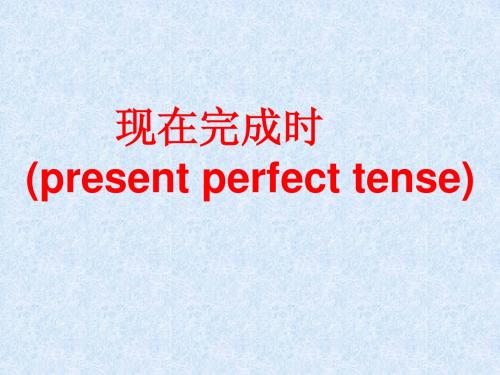
She has just left. We have just read the novel. Someone has just broken the window.
He hasn’t written to me for two years.
注意: 2. since 引导的时间状语中, since 后 面的时间名词必须是时间点, 而 for 短语中 的时间名词必须是一段时间.
从北京回来后他就很忙.
我学英语已经学了多年了. He has been busy since he came back from Beijing. I have learnt English for many years.
I haven’t worked as a nurse for many years. I stopped working as a nurse many years ago.
3.重复发生的动作发生在尚未结束的时间里,经 常有时间状语:
today, thismorning/afternoon/evening/week/ month/year/century, how many ቤተ መጻሕፍቲ ባይዱimes/5times,etc
2. 已故伟人的言行也用现在完成时
Shakespeare has written most of the best plays we know. Newton has explained the movements of the moon from the attraction of the earth.
Present Perfect Tense
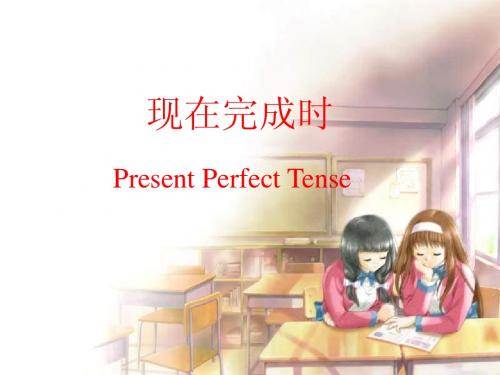
他在上海10年了。 He has been in Shanghai for ten years 他去上海了。 He has gone to Shanghai.
heard kept
made
此外还有leave, win, tell, spend, say,meet等等。
5. ABC型 (三者不一致)
eat give write ate gave wrote eaten given written
see
get
saw
got
seen
gotten
begin
began
cook
arrive
cooked
arrived
不规则动词过去分词的构成
1. 三个主要动词
is, am be was
been had done
are
have/has
were
had did
do/does
2. AAA型 (三者一致)
cut let put cost read cut let put cost read cut let put cost read
现在完成时的构成: have/has + 动词的过去分词
注:动词过去分词的构成分为规则变化和不规则变化, 规则变化的动词过去分词与过去式是一样的,不 规则变化的动词须特殊记忆。
现在完成时态的句式:
1.肯定句:主语+ have/has+过去分词+其他成分。
2.否定句:主语+have/has+not+过去分词+其他成分。
3.一般疑问句:Have/Has+主语+过去分词+其他成分?
4.特殊疑问句:特殊疑问词+have/has+其他成分?
英语现在完成时讲解

英语现在完成时讲解英语中的现在完成时(present perfect tense)是用来描述过去发生的动作或情况与现在的关系的一种时态。
它通常用来强调过去发生的事情对现在产生的影响或结果。
在本文中,我们将详细讨论现在完成时的使用情况及其构成方式。
一、现在完成时的构成方式现在完成时的构成方式是由“助动词have/has + 动词的过去分词形式”组成。
具体使用有以下几种情况:1. 肯定句主语 + have/has + 过去分词 + 其他部分例如:- I have studied English for five years.(我已经学习英语五年了。
)- She has travelled to many countries.(她已经去过很多国家了。
)2. 否定句主语 + have/has + not + 过去分词 + 其他部分例如:- He hasn't finished his work yet.(他还没有完成工作。
)- We haven't seen each other for a long time.(我们已经很久没有见面了。
)3. 疑问句Have/Has + 主语 + 过去分词 + 其他部分?例如:- Have you ever visited Paris?(你曾经去过巴黎吗?)- Has she seen the latest movie?(她看过最新的电影吗?)二、现在完成时的使用情况现在完成时通常用于以下几种情况:1. 表示过去开始的动作一直延续至今或刚刚结束的情况。
例如:- I have lived in this city for ten years.(我在这个城市已经住了十年了。
)- They have worked on this project since last month.(他们从上个月开始就一直在做这个项目。
)2. 表示过去发生的动作对现在产生的影响或结果。
英语语法的时态
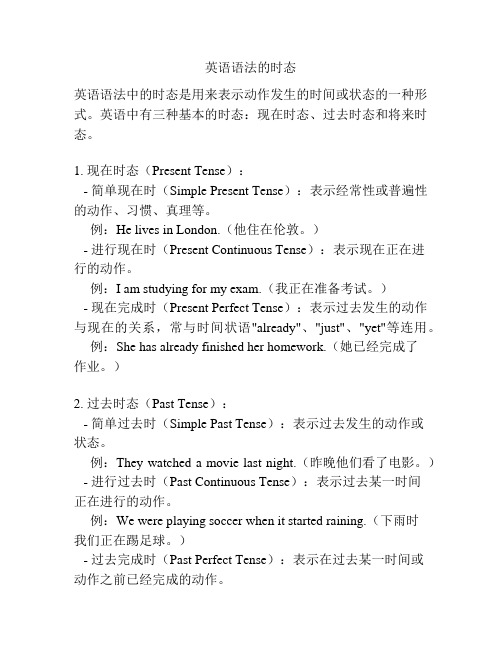
英语语法的时态英语语法中的时态是用来表示动作发生的时间或状态的一种形式。
英语中有三种基本的时态:现在时态、过去时态和将来时态。
1. 现在时态(Present Tense):- 简单现在时(Simple Present Tense):表示经常性或普遍性的动作、习惯、真理等。
例:He lives in London.(他住在伦敦。
)- 进行现在时(Present Continuous Tense):表示现在正在进行的动作。
例:I am studying for my exam.(我正在准备考试。
)- 现在完成时(Present Perfect Tense):表示过去发生的动作与现在的关系,常与时间状语"already"、"just"、"yet"等连用。
例:She has already finished her homework.(她已经完成了作业。
)2. 过去时态(Past Tense):- 简单过去时(Simple Past Tense):表示过去发生的动作或状态。
例:They watched a movie last night.(昨晚他们看了电影。
) - 进行过去时(Past Continuous Tense):表示过去某一时间正在进行的动作。
例:We were playing soccer when it started raining.(下雨时我们正在踢足球。
)- 过去完成时(Past Perfect Tense):表示在过去某一时间或动作之前已经完成的动作。
例:She had already left when I arrived.(我到达时她已经离开了。
)3. 将来时态(Future Tense):- 简单将来时(Simple Future Tense):表示将来某个时间将会发生的动作。
例:I will call you tomorrow.(明天我会给你打电话。
现在完成时(The-present-perfect-tense)的用法小结
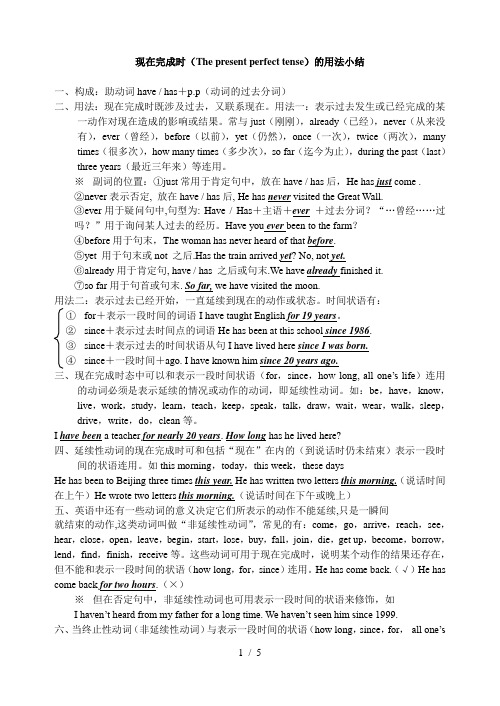
现在完成时(The present perfect tense)的用法小结一、构成:助动词have / has+p.p(动词的过去分词)二、用法:现在完成时既涉及过去,又联系现在。
用法一:表示过去发生或已经完成的某一动作对现在造成的影响或结果。
常与just(刚刚),already(已经),never(从来没有),ever(曾经),before(以前),yet(仍然),once(一次),twice(两次),many times(很多次),how many times(多少次),so far(迄今为止),during the past(last)three years(最近三年来)等连用。
※副词的位置:①just常用于肯定句中,放在have / has后,He has just come .②never表示否定, 放在have / has后, He has never visited the Great Wall.③ever用于疑问句中,句型为: Have / Has+主语+ever+过去分词?“…曾经……过吗?”用于询问某人过去的经历。
Have you ever been to the farm?④before用于句末,The woman has never heard of that before.⑤yet 用于句末或not 之后.Has the train arrived yet? No, not yet.⑥already用于肯定句, have / has 之后或句末.We have already finished it.⑦so far用于句首或句末. So far, we have visited the moon.用法二:表示过去已经开始,一直延续到现在的动作或状态。
时间状语有:①for+表示一段时间的词语I have taught English for 19 years。
②since+表示过去时间点的词语He has been at this school since 1986.③since+表示过去的时间状语从句I have lived here since I was born.④since+一段时间+ago. I have known him since 20 years ago.三、现在完成时态中可以和表示一段时间状语(for,since,how long, all one’s life)连用的动词必须是表示延续的情况或动作的动词,即延续性动词。
现在完成时 (Present Perfect Tense)

现在完成时(Present Perfect Tense)(1)表示过去发生或已经完成的动作对现在造成的影响或结果。
—It’s so dark.太黑了。
—Someone has turned off the light.有人把灯关上了。
(2)表示从过去某一时间开始并一直持续到现在的动作或状态。
常与since+过去的时间点,for+一段时间,since+时间段+ego,so far等时间状语连用。
Eg.I have lived here for ten years.我已经住在这里10年了。
(从10年前开始,持续到现在还住这儿)Eg.I have lived here since2003.自从2003年我就住在这儿。
(从2003年开始,持续到现在还住这儿)(3)基本结构及句型转换:主语+have/has+过去分词(done)(当主语是第三人称单数has,其余人称用have。
)①肯定句:主语+have/has+过去分词+其他I have finished my homework.(肯定句)②否定句:主语+have/has+not+过去分词+其他I have not finished my homework.(否定句)③一般疑问句:Have/Has+主语+过去分词+其他—Have you finished your homework?—Yes,I have./No,I haven’t,(一般疑问句及肯定、否定回答)(4)has gone(to),has been(to),has been(in)的区别Have/Has gone(to):去了(现在不在说话现场)Eg.---Where is your father?---He has gone to Shanghai.Have/Has been(to):去过(已不在去过的地方)Eg.My father has been to Shanghai.Have/has been in:呆了多久(还在所呆的地方)Eg.My father has been in Shanghai for two months.=My father has been in Shanghai sin ce two months ago.(5)现在完成时的标志:①常与just,already,yet,ever,never,before,so far等连用,强调动作的完成,不强调动作的持续。
现在完成式(Present

現在完成式(Present Perfect Tense)前言:動詞有三態 原形(VR)、過去式(pt)、過去分詞(pp)規則變化:原形動詞+ed 則形成過去式和過去分詞不規則變化:AAA型(動詞三態相同)put-put-put , read-read-read , hurt-hurt-hurt , cost-cost-cost …ABB型(過去式與過去分詞相同)win-won-won , hear-heard-heard , buy-bought-bought ….ABC型(動詞三態皆不相同)do-did-done , see-saw-seen , eat-ate-eaten….ABA型(過去分詞與原形動詞相同)run-ran-run , come-came-come …..現在完成式的形式:have+過去分詞/ has+過去分詞(have/has為助動詞)肯定句have+過去分詞/ has+過去分詞否定句haven’t + pp / hasn’t + pp疑問句Have / Has + 主詞+ pp…? Y es, 代名詞have / has.疑問詞have / has + 主詞+ pp…?現在完成式的使用時機(1) have+p.p. haven’t+p.p.I have seen him this morning. (今天早上我已經見過他了。
)He has bought a new bicycle. (他已經買了一輛新的腳踏車了。
)I haven’t given the book to him. (我還沒有把書給他。
)*肯定句可以加入already (位置have already p.p. 或句尾)否定句或疑問句可以加入yet (位置句尾或have yet p.p.)Have you finished your homework yet? (你已經完成作業了嗎?)Y es, I have. I have finished my homework already. (是的,我已經完成作業了。
现在完成时&过去完成时
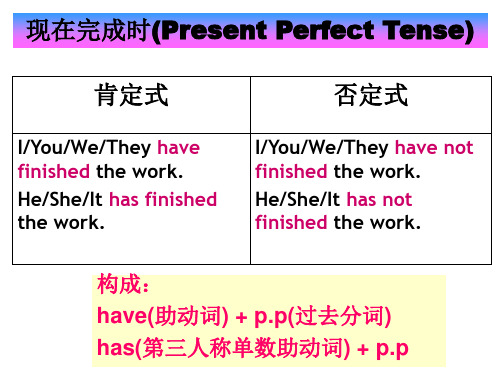
Have been to & have gone to区别
比较:He has been to Beijing. 他曾去过北京。 (人已回来,可能在这儿) He has gone to Beijing. 他已经去北京了。 (人已走,不在这儿)。 have / has been (to) 表示“曾经到过某地”,说话 时此人不在那里,已经回来。侧重指经历。
have not 常缩略为haven’t has not 常缩略为hasn’t
用法
Have you had your lunch yet? 表示过去发生或已经 Yes, I have. I have just had it.(现 完成的动作对现在造 成的影响或结果。 在我不饿了) I haven’t seen her these days. 某些动词的现在完成 I have known Bob for three years. 时可表示过去某一时 I’ve been at this school for over 间开始并一直持续到 现在(包括现在)的 two years. 动作或者状态,可以 They have lived here since 1982 和表示延续的时间状 She has taught us since I came in 语连用。表示持续动 to this school. 作或状态的是延续性 动词。
- No, never,but I went to Canada a few years ago
A. Have; been B. Have; gone C. Did; go D. Do; go
( C )7. You haven’t changed your mind,_______? A. do you B. are you C. have you D. did you ( D )8. How long have you _____ the football team of the school? A. played B. been at C. joined D been on
- 1、下载文档前请自行甄别文档内容的完整性,平台不提供额外的编辑、内容补充、找答案等附加服务。
- 2、"仅部分预览"的文档,不可在线预览部分如存在完整性等问题,可反馈申请退款(可完整预览的文档不适用该条件!)。
- 3、如文档侵犯您的权益,请联系客服反馈,我们会尽快为您处理(人工客服工作时间:9:00-18:30)。
= It is a long time since I saw you last time.
2. 只有在It is… since…这种结构中, 主句的谓语才 可用一般现在式,现在完成式或一般过去式。
a. It is ten years since I left school.
= It has been ten years since I left school. 3. 在句型“ This is the first time( second time)… 中通常也用完成时态。
Verb Filling 1. I ____________ have been here since last October.(be) has taught 2. She _____________me since I came to this school.(teach) 3. These shoes are worn out. They_____________ have lasted a long time.(last) 4. I _______________here all my life but I am going have lived away.(live) haven’t bought anything for three months.(not buy) 5. I _______________ haven’t touched beer for a whole week.(not touch) 6. I _______________
She has not left home ever since she lost the job.( T )
6. 注意区别下列各组句子: a. Did you get up early?
你起来得早吗?(指动作本身)
Has he got up?
他起来了吗?(指现在情况,还在不在床上)
b. What did you have for lunch?
最近三星期她一直骑自行车上班。 c. We have been seeing quite a lot of each other recently. 最近我们常常见面。 d. All these years they have been contributing articles to our magazines. 这些年来他们一直为我们的杂志写稿。
have learned 11. I ______________ a lot during the year.(learn)
12. It will no doubt be argued by some that what have been describing is not a crisis of industry.(describe) I__________________ Have you ____________ been waiting long for me?(wait) 13._______
a. Is this the first time you have visited Beijing?
b. This is the second time you have failed in the exam.
4. 表示短暂性的动词不能与表示一段时间的状语连用。 这类动词常见的有:appear, begin, borrow, buy, close, come, die, fall, find, finish, join, kill, leave, lend, lose, sell, start, stop, etc.
4.现在完成进行时也可以用来表示在以前这段时期 反复发生的事情: a. He has been scoring plenty of goals this season. 在这个赛季,他踢进了许多球。 b. She has been cycling to work for the last three weeks.
你中饭吃什么?(指动作本身)
Have you had your lunch? 你吃过中饭吗?(询问现在状态)
c. She has been ill f现在还病着)
She was ill for three days.
她病了三天。(现在病好了)
7. 有些时间状语, 如:this morning(afternoon), tonight, this May,etc. 既能用于现在完成时,又能用 于一般过去时,但意义有所不同。 a. I have been busy this morning.
b. His father has died for three years.( F ) His father died three years ago. ( T ) His father has just died. ( T ) His father has been dead for three years.( T )
c. He has fallen asleep for an hour.( F ) He fell asleep an hour ago.( T ) d. The film has begun for half an hour.( F ) The film began half an hour ago.( T ) The film has been on for half an hour. ( T )
今天上午我一直很忙。(说话时还在上午) I was busy this morning. 今天上午我很忙。( 说话时已是下午或晚上) b. We have not had much rain this summer. 今年夏天雨水不多。(说话时仍是夏天) We did not have much rain this summer. 今年夏天雨水不多。(说话时夏天已过去)
5. 非持续型动词的否定形式可以表示状态的延续, 可与for, since 时间状语连用。
a. I have seen him for a long time.( F )
I have not seen him for a long time.( T )
b. She has left home ever since she lost the job.( F )
7. Since when ______ have you__________ become so active?(become) 8. The two leaders ____________for two hours.(meet) have met
9. We are going after we _____________ breakfast.(have) have had
a. He has left home for two months. ( F ) He left home two months ago.( T ) He has been away from home for two months.( T ) He has been away from home since two months ago. (T)
Notes:
1. 由since引导的时间状语,它们的主句通常使用完 成时态。 a. He has taught English since 1970.
b. We have known each other since we were little children.
c. It has been a long time since I saw you last time.
a. I have been sitting here all afternoon. 我在这坐了一下午。 b. He is ill. He has been lying in the bed for three weeks. 他在病中,已卧床三个礼拜了。
2.We often use this tense with phrases such as all day, all afternoon, for five hours( for…), all this time,recently,this week, this month, etc. These phrases help to stress the action is still continuing.
have been saying 14.You __________________that for five years.(say)
b. I have sat/been sitting here for over two hours.
c. How long have you studied/been studying here? d. She has worked/been working here for eight years.
The present perfect continuous tense
Pattern: … have been doing…
1.We use this tense to talk about an action which started in the past and is still continuing or stopped just now.It is used with the words such as live, learn, lie, stay, sit, wait, stand, rest, study,etc.
2. 在强调动作延续的时间长久时,用现在完成进 行时多一些: a. I have been wanting to do it for a long time.
b. She has always been working like that.
3. 试比较下列句子:
